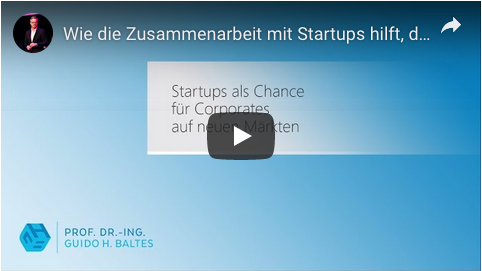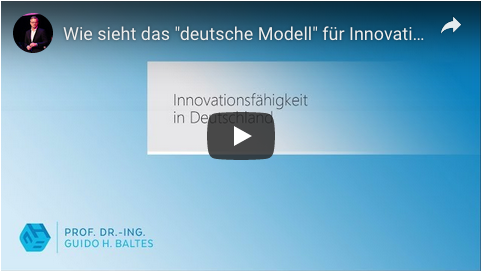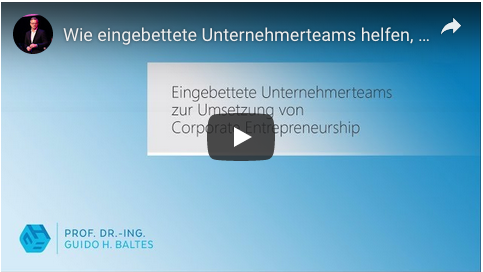Excubation is a cooperative research project of the University of Applied Sciences Constance and various partners from industry. The aim of this research project is the development of a modular methodology and solution for the implementation of transformational innovation initiatives in technology companies.
Baden-Württemberg is regarded as one of the leading technology locations in Germany and Europe. Characterized by a corporate landscape of globally operating corporations such as Daimler, Bosch or SAP and highly specialized small and medium-sized enterprises (hidden champions), which are among the leading providers in their respective industries. The success of these companies is primarily due to their know-how and innovative strength. The focus is on the so-called organizational ambiguity, which describes the challenge companies face in efficiently optimizing their existing businesses on the one hand and establishing new transformational business fields on the other. This ability is essential to ensure sustainable competitiveness.
In order to be able to meet most of these challenges even in times of digitalisation, the Baden-Württemberg Ministry of Education and Science is funding the Excubation project from 1 July 2014 to 30 June 2016. The term Excubation refers to an alternative innovation model that works with semi-autonomous entrepreneurial teams. This model describes the temporary spin-off of these teams in the "start-up" phase and, depending on the strategic fit, the reintegration into the parent organisation (spin-in) or the continuation as an independent company (spin-out). A particular advantage of this method is the minimization of the innovation risk for the company as well as a general risk minimization for the members of the semi-autonomous team. In addition, it can be prevented that innovations cannot unfold due to the inertia and stability of the fixed structures and routines of large companies.
Case Study: LEGIC
One result of this research project is the highly interesting case study with LEGIC Identsystems.
Click here to go to the Case Study: LEGIC
At the centre of this research project is a deeper understanding of the working methods and conducive framework conditions of semi-autonomous entrepreneurial teams. Since a large number of different implementation variants can be found in practice, a matching between the organisational forms and strategic objectives of the parent company is also examined. Due to the complexity of this topic, a series of expert interviews was started for the study. The survey includes contact persons in management on the part of the parent organisation, the corporate entrepreneur as head of semi-autonomous teams and members of these teams. The holistic study design provides particularly valuable data, which enabled the development of a modular methodology and solution for the implementation of transformational innovation initiatives.
Publications
- Baltes, G. und Freyth, A. (2017): Die radikal neuen Anforderungen unserer Zeit und die Konsequenz für Veränderungsarbeit, in: Baltes, G. und Freyth, A. "Veränderungsintelligenz", Springer/Gabler, pp 1-80
- Baltes, G. und Selig, C. (2017): Organisationale Veränderungsintelligenz - Wachstumsfähigkeit mit strategischer Innovation erneuern, in: Baltes, G. und Freyth, A. "Veränderungsintelligenz", Springer/Gabler, pp 81-168
- Freyth, A. und Baltes, G. (2017): Veränderungsintelligenz auf individueller Ebene: Persönliche Agilität und agiler führen, in: Baltes, G. und Freyth, A. "Veränderungsintelligenz", Springer/Gabler, pp 323-420
- Selig, C. und Baltes, G. (2017): Corporate Entrepreneurship stärken: Der angestellte Unternehmer und sein Team, in: Baltes, G. und Freyth, A. "Veränderungsintelligenz", Springer/Gabler, pp 421-454
- Selig, C., Baltes, G. (2017): Clarifying the Roles in Corporate Entrepreneurshipe Entrepreneurship, 2017 IEEE-ITMC & 23th ICE conference, Madeira (PT), p. 1-8
- Klosa, K., Baltes, G. (2017): LEGIC Identsystems Ltd: From selling ID cards to providing access to an ID network. In: Linz, C., Müller-Stewens, G., Zimmermann, A. Radical Business Model Transformation: Applying Behavioural Insights for Improved Organizational Strategy, 3. Jan 2017, Kogan Page, p. 113-123
- Selig, C., Stettina, C., Baltes, G. (2016): The Corporate Entrepreneur: A driving force for strategic renewal and radical innovation in established companies. 2016 IEEE-ITMC & 22th ICE conference, Trondheim (NOR), p. 1-12
- Gasser, T., Baltes G. (2015): Corporate Entrepreneurship – LEGIC meistert die Digitale Transformation, Corporate Incubation Fachartikel Serie, Startplatz Köln, 10. Oktober 2015
- Koenig, M., Baltes, G. (2015): Excubation: Ein alternatives Innovationsmodell, Steinbeis Transfermagazin, Ausgabe 01/2015


